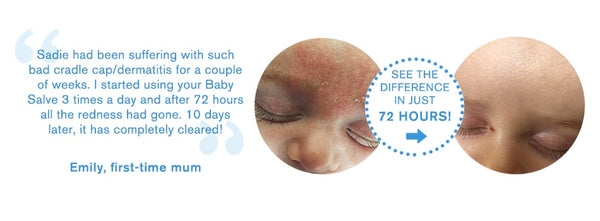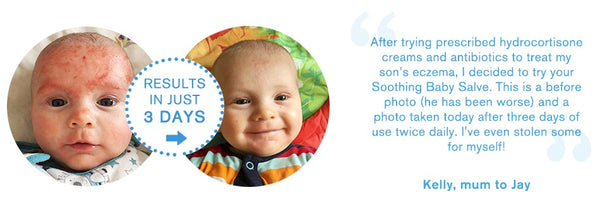This guide offers information about eczema in babies and children. We look at what eczema is and what can be the cause.
We also look at how you should treat allergies and focus on the best ways to control eczema, including ingredients to avoid which are common irritants for eczema-prone babies and children.
Skin care for babies with eczema-prone skin
Infantile eczema or Atopic dermatitis is a very common condition, thought to affect 1 in 8 babies, so if your baby has eczema, you are in the same position as thousands of other mums in the UK.
Many babies who are prone to eczema also have sensitive skin or allergies, which can make it hard to find skin care products that soothe and protect their skin.
Organic Babies is a very gentle natural range that is suitable for babies and children who may be prone to eczema. See Organic Babies products now.
Our 2 gentle favourites for sensitive babies
Real-life results with our Soothing Baby Salve
What is an allergy and what is eczema?
WHAT IS AN ALLERGY?
The immune system is supposed to protect the body from bacteria and other harmful substances. When the immune system misinterprets harmless substances like pollen or types of food, an allergic reaction occurs.
Common symptoms of an allergy are asthma, eczema, swelling, rashes, sneezing, itchy eyes or skin, stomach pains, diarrhoea, constipation and migraines.
WHAT IS ECZEMA?
Eczema is an unpredictable skin condition which can flare up at any time. When your baby or child has eczema the skin fails to do its job of acting as a barrier to prevent water and heat from getting out and bacteria and irritants getting in. This results in red, sore, itchy, dry skin.
What triggers allergies?
Allergic reactions are caused by ’allergens’. Almost anything can be an allergen, however most usually contain a protein which is what triggers the reaction from the immune system. Allergies can be hereditary or acquired, often appearing spontaneously.
Food intolerance is most common in babies and children. However, most children grow out of their intolerances.
COMMON NON-FOOD ALLERGENS
- Pollen
- House dust mite
- Moulds
- Pets such as cats, dogs & horses
- Insects such as wasps & bees
- Chemicals
- Medicines
- Latex
COMMON FOOD ALLERGENS
- Milk
- Egg
- Soya
- Wheat/Gluten
- Fish
- Shellfish
- Nuts
- Dairy
How should you control allergies?
Conventional tests like blood tests, skin prick and patch tests can be carried out by your doctor if your child's symptoms persist. If their symptoms take longer to appear, it may be harder to diagnose with these tests.
There are other forms of tests available from alternative practitioners and health food shops that could determine what your child's allergy is; alternatively if you believe your child has a food intolerance you could try eliminating certain foods from their diet to see if their symptoms reduce.
How should you control eczema?
Eczema can irritate and aggravate your child or baby. It is important to not use toiletries that contain harsh foaming agents, sensitising preservatives or perfumes as these are known irritants to eczema prone skin.
All of our organic baby products are free from sodium lauryl/laureth sulphate, parabens, lanolin, propylene glycol, harsh foaming agents, synthetic fragrances, irritating emulsifiers, PABA-sunscreen, petrochemicals, ethyl alcohol, colourants, DEA, TEA, PEGs, urea and all other unnecessary synthetic additives common in many of today’s health and beauty care products.
Parents with children who suffer from eczema can also find it helpful keeping a food diary so any specific foods can be identified that trigger the eczema.
Our customer care team is happy to help with any questions you may have about skin care for babies with eczema. Please call us on 01403 740350 or leave a comment or question below.




























